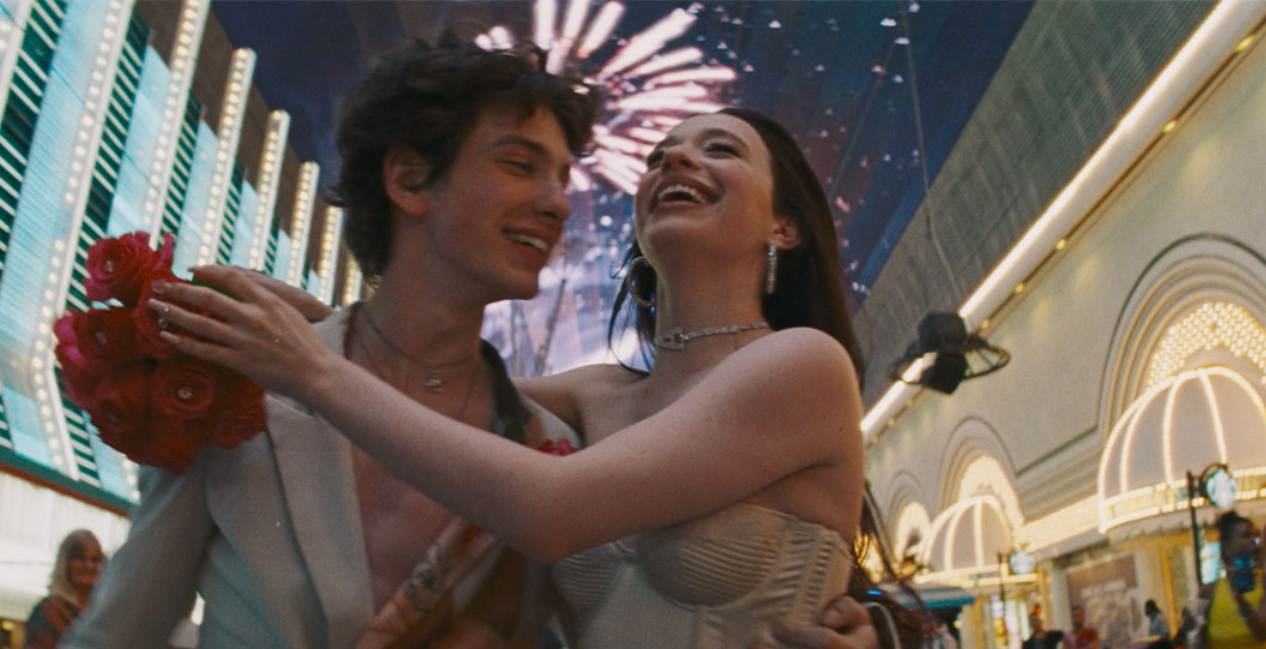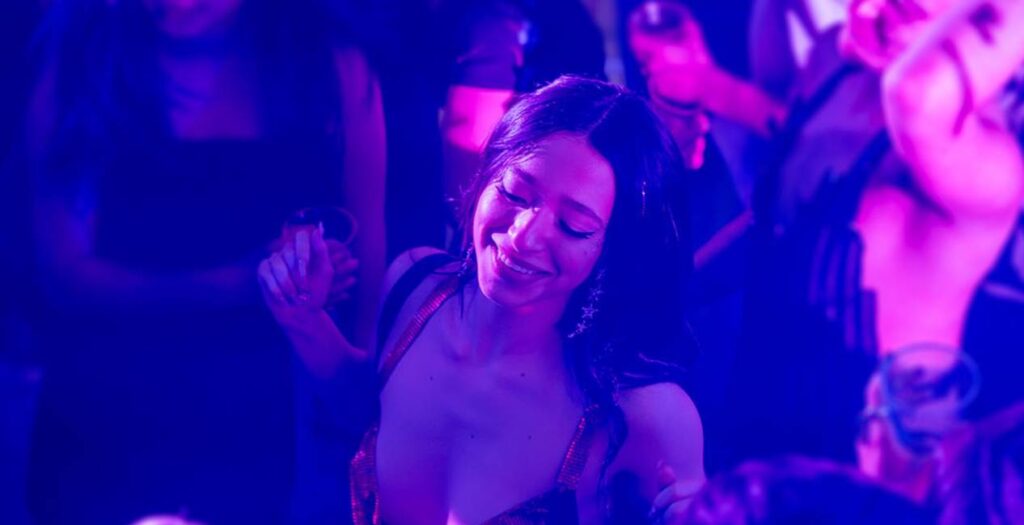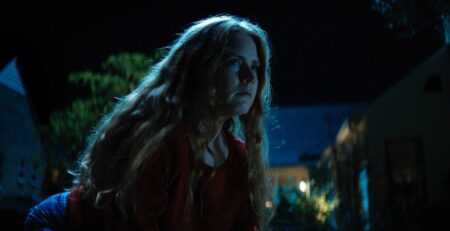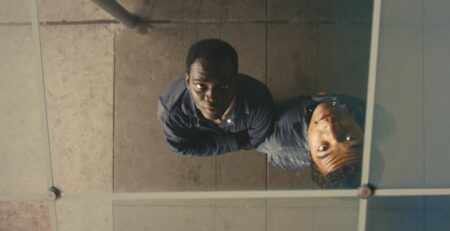Sean Baker is one of America’s foremost neo-realists. His fiercely independent lens captures an America forcibly hidden beneath the cracks with honesty. From Tangerine’s transgender sex workers to The Florida Project’s motel dwellers, Baker both indicts the detritus of the American Dream and illuminates the beautifully flawed characters living amongst it. It’s only fitting he brings that magical, lifelike touch to the screwball comedy with Anora— a rich, layered, and wonderfully lived-in experience that, despite how outrageous it becomes, never fails to teem with painfully real emotions, outcomes, and concessions. It’s arguably Baker’s most immersive, accessible, and purely entertaining film, replete with some of the most unforgettable characters in recent memory.
The Palme d’Or winner centres on the titular Anora (Mikey Madison), or “Ani” as she often corrects others, a saucy 23-year-old erotic dancer living in the largely Russophone Brighton Beach, Brooklyn. She doesn’t like to speak the language she learned from her immigrant grandmother but when she’s tasked with servicing some big Russian clients, chief among them Vanya (Mark Eydelshteyn), the 21-year-old son of a wealthy oligarch, a connection kindles. We, like Ani, fall under Vanya’s boyish spell, as private outcalls to his father’s mansion turn into an exclusive, extravagant week-long engagement, and then finally an impromptu marriage—partly motivated by Vanya’s desire to avoid working in his father’s company back in Russia.
It seems Ani’s days of hustling private dances are finally over, and what awaits is a fairytale romance and a larger-than-life existence. Yet, when news of their marriage reaches Vanya’s parents, his Godfather Toros (Karren Karagulian) and his henchman, Garnick (Vache Tovmasyan) and Igor (Yura Borisov), are quickly dispatched to annul the marriage. After Vanya flees, Ani must fight tooth and expensive nail to save the dream.
Anora is at once so vivid and incredibly funny. Much of it is the result of Baker’s naturalistic eye. Shot in a free-flowing, verité style by cinematographer Drew Daniels, each moment evokes observation’s pure and simple pleasure. We become flies on the wall, privy to moments that feel ludicrous yet utterly believable.
It’s such commitment to authenticity that renders the moment-to-moment humor so palpable. The intercutting, Robert Altman-esque audio design, where multiple conversations naturally blend and butt into one another, feels immersive on a grand and intimate level. Hijinks, gags, and punchlines don’t begin or end but simply exist, cascading through the ether and operating on pure whim and impulse.
It becomes invigorating to simply observe the flaws, misunderstandings, and wanton desperation of each character. It’s the rare American comedy that shares more in common with non-fiction than anything scripted, full of unadulterated life in both its glory, hilarity, and calamity. If Anora only consisted of its wonderfully chaotic middle sequence, where Toros and his men first confront the newlyweds, it would still go down as one of the year’s greatest achievements. It’s a scene that epitomizes the realist magic of Baker’s vision, full of misunderstanding, destructive physicality, and impeccable comedic timing, all the while retaining the honesty and humanity that makes Anora so absorbing.

Baker’s naturalism feeds into the performances, all of which are lively and eclectic. It’s easy to see why Ani is sucked into the dream painted by Vanya, brought to life with dizzying amounts of charm by Eydelshteyn in his English-language debut. In the words of Ben Harp from Point Break, Vanya is “young, dumb, and full of come,” a free-spirited rich kid who doubles as a ball of pure, inelegantly sexed-up energy.
Eydelshteyn seduces the audience like he does Ani. From the amusing nude flip he does onto his bed to the hilarious toasts he makes at nightclubs: “Here’s to having a hard-on and lots of money!” Eydelshteyn’s cadence makes us disregard every red flag and broken promise to hang with him just a few minutes longer. Yet, Eydelshteyn also nails the sad, aimless spirit at his core, a kid who, despite his influence, is little more than a meek pawn for his wealthy parents.
Such picture-perfect casting peaks with Toros and his partners, who are all played by relative unknowns. The henchman, who, in any other movie would be one-note and evil, burst with color asweirdly likable people. Karagulian’s Toros is a scene-stealer, often feeling like a real-life figure plopped into this fictional story, especially when he squabbles with tow-truck drivers and young adults who ignore his questions: “no respect for elders…you’re only ambition in life is to buy sneakers!”. Then there’s the awkward Igor, who Borisov renders the perfect thematic foil to Ani’s brassy, combative persona. This true-to-life casting is key to Baker’s full-immersion approach, where the screwiest of moments begin to reflect life in both comical and painful ways.
At the heart of it all lies Madison’s virtuosic turn as Ani. It’s a performance that demands complete vulnerability, physicality, and charisma. Madison rises to the task and then some, even speaking in a second language, for stretches. The personal strokes, contours, and details she lends Ani result in one of the most authentic, lived-in characters in recent memory and one of the strongest performances of the 21st century. With subtle and boisterous inflections, Madison forces us to dream with her, laugh with her, fight with her, and ultimately, cry with her.
As funny as Anora is, it’s equally devastating, manifesting as a scathing inversion of the Pretty Woman fantasy. It continues Baker’s class-conscious exploration of the lives of sex workers with great pathos, often inventively pulling the rug from under its characters just when we think they’ve figured it out.
Anora understands the game is rigged, and the American Dream is a hokey script written by someone else. It’s perhaps why Baker leans toward such authenticity and honesty, crafting something so immersive that it might as well be a mirror. Ani tells Igor, “In America, we don’t give meaning to names,” and that attitude defines the unfair, exploitative system we live in. With its screwball tale, Anora contends that maybe we should start looking deeper at the cracks before our own dreams are put to bed.
Anora screened as part of the 2024 Toronto International Film Festival and will be released in theatres on October 25th.
Anora
-
Rating - 9.5/109.5/10
TL;DR
Anora understands the game is rigged, and the American Dream is a hokey script written by someone else. It’s perhaps why Sean Baker leans toward such authenticity and honesty, crafting something so immersive that it might as well be a mirror.





